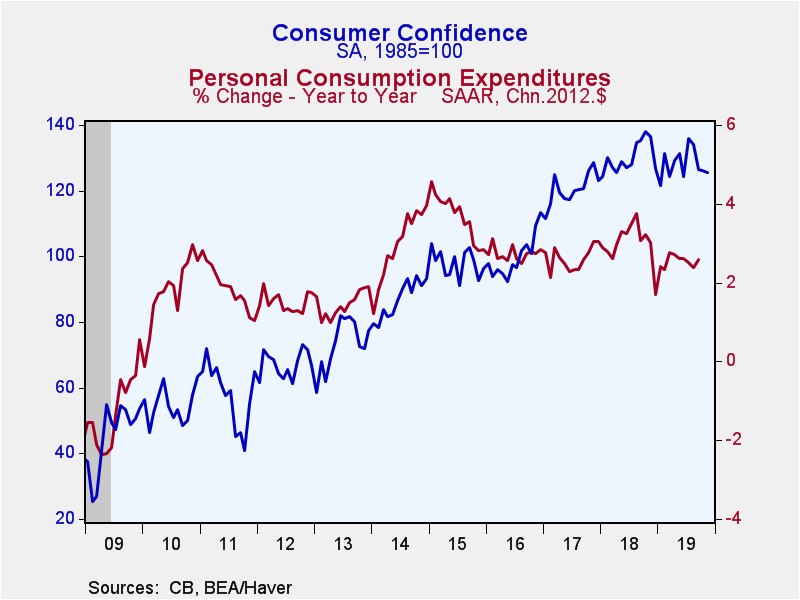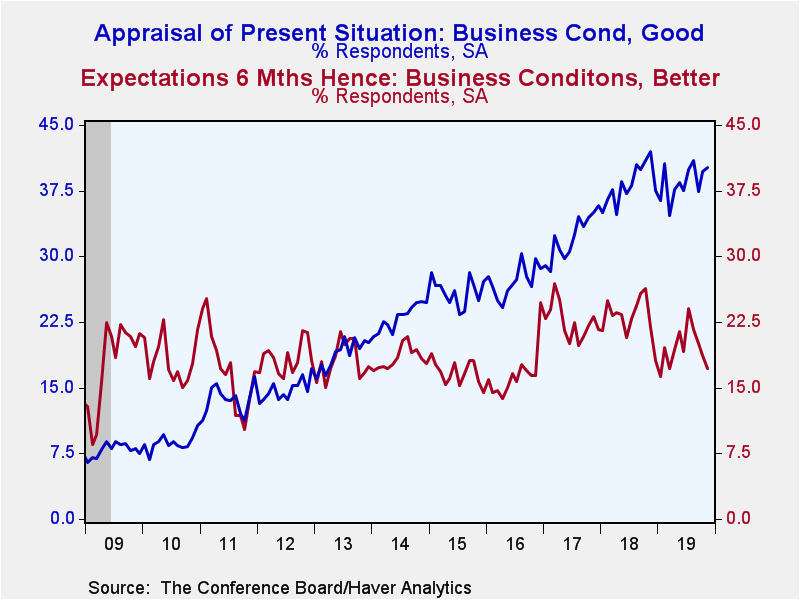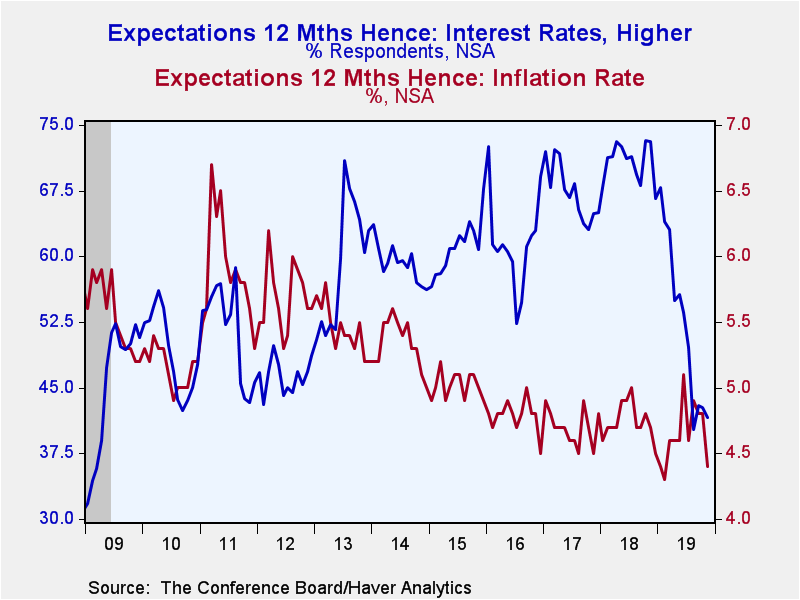 Global| Nov 26 2019
Global| Nov 26 2019U.S. Consumer Confidence Declines Further
by:Tom Moeller
|in:Economy in Brief
Summary
The Conference Board's Consumer Confidence Index for November eased 0.5% (-8.0% y/y) to 125.5 after a little-revised 0.2% October decline. It was the fifth decline in the last six months and left the confidence level 9.1% below its [...]
The Conference Board's Consumer Confidence Index for November eased 0.5% (-8.0% y/y) to 125.5 after a little-revised 0.2% October decline. It was the fifth decline in the last six months and left the confidence level 9.1% below its expansion peak reached in October of last year. A rise to an index level of 127.0 had been expected in the Action Economics Forecast Survey. The latest was the lowest level of confidence since June. During the last 20 years, there has been 72% correlation between the level of confidence and the y/y change in real consumer spending.
The decline in confidence reflected a 3.8% shortfall (-3.4% y/y) in the present situations reading to 166.9, the lowest level since June. The expected situations reading improved 3.6% (-12.8% y/y), the first m/m increase since July.
An improved 40.2% of respondents felt that business conditions were good, but that remained below the 42.0% high reached last November. Jobs were viewed as hard to get by an increased 12.7% of respondents, the most since June. A lessened 44.8% felt that jobs were plentiful. On the expectations front, an increased 21.8% thought that income would increase for six months, but that remained below July's high of 24.9%. A greatly lessened 17.2% of respondents thought that business conditions would improve in six months, down from the October 2018 high of 26.3%. A significantly reduced 15.7% of respondents expected more jobs in six months, down from 22.6% in June of last year.
Expectations for inflation in twelve months declined sharply to 4.4%, remaining below June's high of 5.1%. Forty-two percent of respondents thought that interest rates would rise over the next year versus 73% who thought so 12 months ago. An improved 39% of respondents felt that stock prices would rise, but that remained below the 44% who thought so last October.
A greatly reduced 0.7% of respondents planned to buy a new home and a lessened 48% planned to purchase a major appliance.
Confidence amongst survey respondents under age 35 weakened 10.9% (-19.5% y/y) in November. The index level remained sharply below its peak twelve months ago. Confidence amongst respondents aged 35-54 fell 4.4% (-4.0% y/y), the third decline in four months. Confidence amongst respondents over age 55 improved 8.7% (-4.6% y/y) to a six-month high.
The Consumer Confidence data are available in Haver's CBDB database. The total indexes appear in USECON, and the market expectations are in AS1REPNA.
| Conference Board (SA, 1985=100) | Nov | Oct | Sep | Nov Y/Y % | 2018 | 2017 | 2016 |
|---|---|---|---|---|---|---|---|
| Consumer Confidence Index | 125.5 | 126.1 | 126.3 | -8.0 | 130.1 | 120.5 | 99.8 |
| Present Situation | 166.9 | 173.5 | 170.6 | -3.4 | 164.8 | 144.8 | 120.3 |
| Expectations | 97.9 | 94.5 | 96.8 | -12.8 | 107.0 | 104.3 | 86.1 |
| Consumer Confidence By Age Group | |||||||
| Under 35 Years | 115.3 | 129.4 | 150.0 | -19.5 | 133.7 | 130.2 | 122.4 |
| Aged 35-54 Years | 124.9 | 130.7 | 127.3 | -4.0 | 132.2 | 123.5 | 106.2 |
| Over 55 Years | 131.3 | 120.8 | 115.4 | -4.6 | 126.3 | 112.9 | 84.6 |
Tom Moeller
AuthorMore in Author Profile »Prior to joining Haver Analytics in 2000, Mr. Moeller worked as the Economist at Chancellor Capital Management from 1985 to 1999. There, he developed comprehensive economic forecasts and interpreted economic data for equity and fixed income portfolio managers. Also at Chancellor, Mr. Moeller worked as an equity analyst and was responsible for researching and rating companies in the economically sensitive automobile and housing industries for investment in Chancellor’s equity portfolio. Prior to joining Chancellor, Mr. Moeller was an Economist at Citibank from 1979 to 1984. He also analyzed pricing behavior in the metals industry for the Council on Wage and Price Stability in Washington, D.C. In 1999, Mr. Moeller received the award for most accurate forecast from the Forecasters' Club of New York. From 1990 to 1992 he was President of the New York Association for Business Economists. Mr. Moeller earned an M.B.A. in Finance from Fordham University, where he graduated in 1987. He holds a Bachelor of Arts in Economics from George Washington University.
More Economy in Brief
 Global| Feb 05 2026
Global| Feb 05 2026Charts of the Week: Balanced Policy, Resilient Data and AI Narratives
by:Andrew Cates










